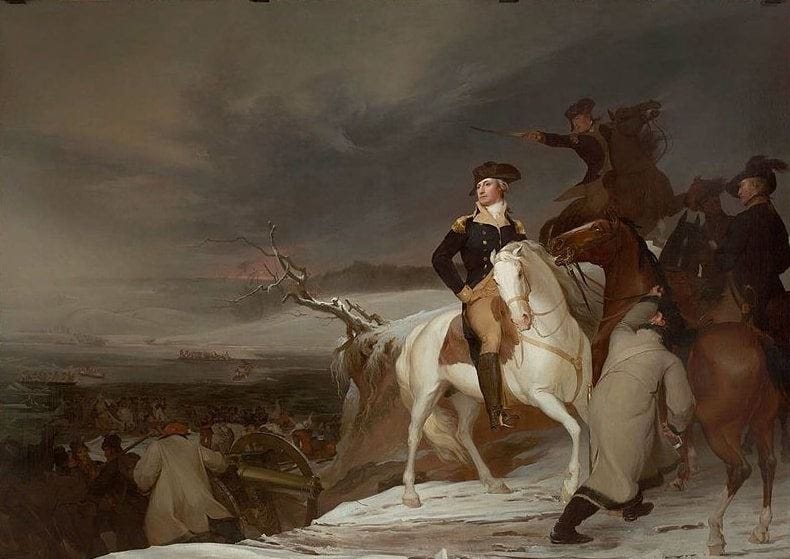On New Year's Day, news publisher Benjamin Towne took stock of the year that had passed in a world that had gone mad.
Lockdowns and martial law had taken root up north. People were threatened with arrest for violating the lockdown. An emergency order led to discrimination.
Does this sound like 2021, particularly the vaccine passport and mandate orders in New York? Yes, but in Towne's case, the world that had gone mad was America in 1775 and the year ahead was 1776.
Two days earlier, Towne had published a report from New York showing the fallout of 1775's biggest news story. War had broken out between British soldiers and the Continental militia at Lexington and Concord, Massachusetts, in April 1775.
"We are credibly informed, that the people of the Massachusetts Bay have completed 13,000 suits of soldiers' clothes entirely of their own wool, flax, and manufactory, since the Battle of Lexington," Towne had reported on Dec. 30, 1775, of grassroots progress to assist the patriots.
On the same page, he had also reported on the lockdown in the city of Boston by the British military. Under British General Howe, Bostonians were trapped by martial law, especially during emergency situations like a recent fire, which led to this new order that Towne published.
"Upon the discovery of a fire, notice is to be given as usual by the ringing of the bells, and the cry of fire in the streets, at which time the regiments will immediately get underarms on their regimental parades, and wait for further orders. All persons failing to do so will be punished in a very exemplary manner."
While this emergency order was reasonable for the British troops, the inhabitants lost one of their rights: to carry a musket.
"Neither are the inhabitants to be stopped and impeded in time of fire by the military, unless they are armed, in which case they are to be taken into custody."
Discrimination was also in place. "Women belonging to the army will not be allowed to be present at any fire that may happen."
Under these circumstances in a world gone mad, how did Towne launch 1776 in his newspaper?
Instead of publishing a traditional four-page newspaper on January 1, 1776, Towne opted for soley printing a single poem in the Pennsylvania Evening Post.
"Poor Tom's a-cold -- God bless you, Masters, and save you all from all disasters! Time turns his glass, and round the pole. Another year begins to roll: Welcome the new, adieu the old, for every year for Tom's a-cold," the poem began.
What does "Poor Tom's a-cold'' mean? This is a literary reference to Shakespeare's King Lear, when a character disguised himself as Tom O'Bedlam. "Poor Tom's a-cold" symbolized madness, a storm indicating chaos in both the natural and social world.
Using "Poor Tom's a-cold' as an image for the world gone mad in 1775, Towne's poem yearned for happier times.
"They just have said, and bards have sung, that long ago when time was young, the world enjoyed a golden age: No dogstar kindled then to rage; no summers the drought, nor winter snow, forbade the limpid stream to flow: . . . . No din of war, no civil hate, were then the chastening rods of fate."
After listing several similar items, Towne's poem placed destiny into the hands of the reader.
"But now, alas! Poor Tom's a-cold: But you, who live with hearts at ease, will surely never let him freeze."
Then this news publisher concluded with his New Year's wish for 1776.
"Sweet Madam, gentle Sir, good morrow; God keep you free from pain and sorrow. And let me hope, are long to boast: Good news! ---- good news! ----- In The Evening Post."
Good news, of course, came in 1776. Towne was first to report the good news that a new pamphlet had been published on January 9, 1776.
"Common Sense addressed to the inhabitants of America, on the following interesting subjects.
Of the origin and design of government in general, with concise remarks on the English Constitution.
Of monarchy and hereditary succession.
Thoughts on the present state of American Affairs.
On the present state of America with some miscellaneous reflections."
Common Sense would prove to be a groundbreaking document that paved acceptance for independence.
Good news kept coming. General George Washington freed Boston from the grip of the British lockdown in the spring. The Continental Congress gave the American people the Declaration of Independence on July 4, 1776.
Then after a series of devastating military defeats in New York, Washington crossed the Delaware River on December 25-26, 1776, and ended the year with a victory known as the Battle of Trenton.
Many would say that our world of 2021 has gone mad. Poor Tom's a-cold. Government leaders destructively pit vaccinated versus unvaccinated Americans against each other.
Censorship runs rampant on Twitter and Facebook. In the last week of 2021, Twitter canceled the account of Dr. Robert Malone, the inventor of the mRNA technology that was later adapted into COVID-19 vaccines. Malone's Twitter crime was holding common sense nuanced positions and raising questions about vaccine safety and early treatment options.
Facebook is just as guilty of censorship. It permanently disabled the ads of a children's book publisher for its Heroes of Liberty books about Supreme Court Justice Amy Coney Barrett, former President Ronald Reagan and author Thomas Sowell.
"To cancel children's books because they celebrate American values that 90% of Americans believe in isn’t even anti-conservative bias, it's anti-American. Pure madness," Bethany Mandel editor declared in response.
Yes, Poor Tom is a-cold today but we can not let him freeze. Americans need to tap their common sense and fight back against the madness.
They also need good news to pull them out of the madness of 2021 and give them a better 2022. Here's to a Happy New Year.




